#kendrick lamar lyrics
Photo
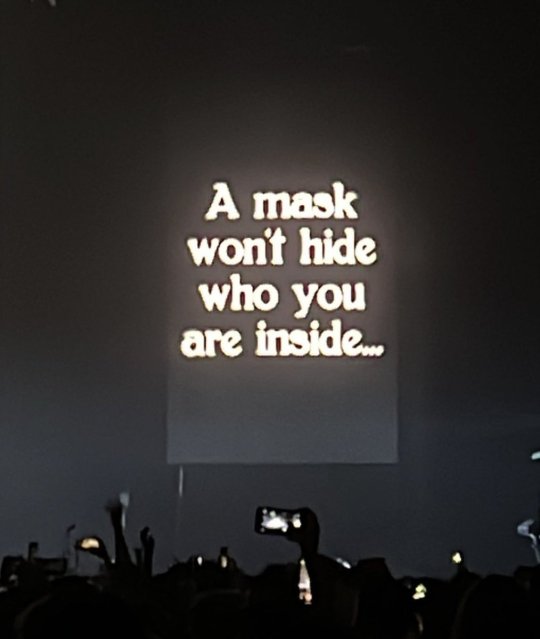
#kendrick lamar#count me out#mr morale and the big steppers#kanye west#tyler the creator#j cole#kendrick lamar lyrics#quotes#hiphop quotes
786 notes
·
View notes
Text

Kendrick Lamar-LOYALTY
2 notes
·
View notes
Text

#kendrick lamar#mirror#mr. morale & the big steppers#kendrick lamar mirror#kendrick lamar lyrics#songs#lyrics#music#quotes#handwriting
14 notes
·
View notes
Text
“fuck a rap battle he should die”

4K notes
·
View notes
Note
Hi now i'm curious what is the beef with the rappers
Man this is going to be long so I'll try to keep this simple and entertaining. I hope this comes across as clear cause I'm shook right now.
Here is a glossarie to break thing up:
Prologue (The Spark 🔥)
Round 1.1 (Physical Education 💪🏾)
Interlude part 1 (Roots 🏠)
Round 1.2 (2 Warning Shots 🔫)
Interlude part 2 (Pusha the Seer 👁)
Round 2.1 (Knifes Out 🔪 )
Round 2.2 (The Nuke 💥)
Epilogue (All eyes on him 👀)
My Theory 🤷🏾♂️
Highly recommend checking out the tracks yourself while you read along.
Prologue (The Spark)
Let it be known that I am a neutral party and that I don't take sides when it comes to rap beef. I was here for the music and creativity. I am just trying to recount events to the best of my knowledge. Sorry if some details are inaccurate.

Okay so basically, Drake, J Cole, and Kendrick Lamar are the Big 3 of the rap world right now.
A month ago, Future and Metro Boomin (two rapper who supposedly don't fuck with Drake anymore) released a song with Kendrick Lamar called "Like That". In the song Kendrick took a shot at Drake and J Cole, saying there isn't a big 3, its only him on top.
4 weeks ago J Cole dropped a track called "7 Minute Drill" that is dissing Kendrick. However, in a move that is very uncharacteristic of J, he took down the official track and formally apologized to Kendrick. Thus signaling his exit from the rap battle.
ROUND 1.1 (Physical Ed)
Drake on the other hand dropped "Push Ups" 2 weeks ago, a diss track that went after other rappers he doesn't like but mainly Kendrick. In it, he made fun of Kendrick's height and his contracts. He then ends the song with "I was really try'n keep it PG" meaning he has a nuke on Kendrick that people don't know.
Not long later, Drake dropped ANOTHER diss track "Taylor Made Freestyle" with Ai voices of Snoop Dog and fucking 2PAC! Kendrick has stated before that 2pac is one of his idols so this must have been a deep cut. In the song Drake claims Kendrick doesn't write his own music and uses the writers of Taylor Swift. Relating a rapper to pop music is seen as disrespectful.
INTERLUDE PART 1 (Roots)
Before I continue, I want to give a brief run down on how the public perceives these two rappers.
Drake portrays himself as a superstar, he's always on social media flaunting his success and partying with other celebrities, seeing alot of women and living a lavish lifestyle. His music is catchy, something you put on in the club. Most of his fan base praise him for his sick beats and witty lyrics. He's been in the music industry for a while and is no push over.
Kendrick Lamar is a very private person, doesn't expose anything about his personal life unless its on a track. He almost never gets into fights with anyone. He is a family man, stressing the importance of being there for his wife and son and encourages other fathers to do the same. His fan base praise him for his creative lyrics and highlighting the black American condition.
ROUND 1.2 (2 Warning Shots)
2 Day ago, Kendrick Lamar came back with his first official diss track on Drake called "Euphoria". In this song, Kendrick goes in on Drakes fake personality. Drake has always been known around the community as a bit of a poser, he grew up in Canada and was raised by his white mother, a relatively comfortable childhood. He was a star on the popular show Degassi when he was young. garnering him a fan base early in his career. Kendrick doesn't approve of Drake appropriating black American culture and acting like he some tough guy. When in reality he is a Canadian nerd thats disrespectful to 2pac. All throughout the song, Kendrick hits at things that many people have know about Drake, such as his behavior around underage girls. He also called Drake a deadbeat father who isn't in his son's life, even referencing his lost battle to Pusha T. Then Kendrick finally warns him that he has more dirt that he is willing to share if Drake takes things further.
Similar to Drake, Kendrick dropped another track called "6:16 in LA" later that day. This song focuses on Drake's environment, specifically the people he hangs with. Kendrick implies that Drake paid people to dig into his background and when they didn't find anything, Drake made up stuff instead. Kendrick then says that someone in Drakes group is leaking information to him about something even more serious. Also planting a seed in Drake's mind that his supposed friends don't actually like him, just like the clout from hanging around him.
INTERLUDE PART 2 (Pusha the Seer)
Taking a quick break again, we need to discuss something that occurred long before Drake's battle with Kendrick.
5 years ago, Drake was in a rap battle with rapper Pusha T, someone who was smaller than Drake at the time in terms of popularity. Pusha dropped a song called "The Story of Adidon" where he dropped a bomb that Drake had a kid and wasn't taking care of him. Drake initially denied it but it was later revealed to be true.
Since then Drake has never responded to Pusha T's diss track, making Pusha the current winner. And Kendrick is bringing it back into the light.
Round 2.1 (Knifes Out)
Around 2 am EST time of May 4th, Drake drops his diss track, "Family Matters" one of his strongest songs, switching his flow 3 times in the span of 7 minutes. In true Drake fashion, its a club song with a catchy beat. Like his previous diss, its aimed at multiple people but the main focus is on Kendrick, even bring up "I was really try'n keep this PG".
Drake doubles down on his black identity and mocks the fact that Kendrick and other rappers are saying he isn't black, (incorrectly assuming that they are coming at him for being mixed when the real issue is that he is appropriating black American rap culture as a Canadian mixed man who grew up in a safe environment) Drake not only calls Kendrick a fraud who only raps about black issues for attention, Or that his activism is performative. He makes a shocking claims that Kendrick is a wife beater. Then Drake says that Kendrick's son doesn't belong to him and implies Kendrick's producer was the real father.
The track caused an uproar. But only for the span of 15 minutes. Because Kendrick did the unthinkable.
ROUND 2.2 (THE NUKE)
Almost as if expecting Drake's move, Kendrick Lamar did what no one saw coming. He dropped his diss track "Meet The Grahams" about 15 minutes after Drake released "Family Matters".
This time around, in a fashion almost unheard of from him, Kendrick strips all the usual metaphors from his lyricism and structures his track like he is speaking to Drake and his family, 4 parts per individual.
Kendrick begins by speaking to Drakes Son, Adonis, the same son Pusha T exposed Drake for neglecting 5 years ago. He's apologizing to him for his father's behavior. Kendrick speaks to him softly but sternly like a mentor, telling him not to be like his father. Kendrick tells Adonis all the things Drake did and warns him not to do them too: involved with escorts, plastic surgery to appear more black, surgery to look more muscular, hiding a kid. (Kendrick stresses that Adonis is black regardless of being mixed, further highlighting that he isn't discrediting Drake's blackness because he's mixed but because he isn't being himself.) Finishing of by telling the kid to be proud of who he is.
The second half is Kendrick addressing Drake's mother and father, Sandra and Denise. Kendrick speaks to her like he's revealing tragic news, explaining to her that her son is involved in disgusting things. He goes down a list of things, his tone growing more intense and angry. Kendrick then claimed that Drake is employing and enabling pedos in his group, and hopes they die. Even implying that his group is going to be raided by the feds some day.
The third half is the MOST shocking of all. Kendrick begins talking to an unnamed individual, simply calls her babygirl. Similar to Adonis, Kendrick takes on a somber tone and apologizes to her for Drakes behavior. He says its not her fault Drake abandoned her, says that she is deserving of love. He warns her not to become a target for people like Drake to pray on and says she has so much to offer the world.
Kendrick revealed Drake has ANOTHER kid and isn't in their life! (Allegedly)
To close of, the fourth half is Kendrick speaking directly to Drake, his tone tired. He tries to reiterate that he doesn't have hate for him. However, Kendrick says Drake was the first one to go after his family and he couldn't let it slide. He once again calls for Drake to take the mask off. Then says this isn't a rap battle anymore, tells Drake he is fighting himself.
Epilogue (All eyes on him)
And so here we are, waiting for what will happen next.
Drake posted an Instagram story denying the claim he has another kid. But given what happened with Pusha T, we can't quite take his word for it yet. We should wait a bit to see if anything comes out.
Kendrick hasn't put out a statement on Drake's claims about him but given the recurring theme of Drake being a manipulative lier, Kendrick clearly denies it. Given how private he is, its difficult to prove or disprove it. Much like Drake's claims, we will have to wait and see if any evidence comes out about it.
Drake and Kendrick stans are at eachothers throats right now, arguing over who one and whats real or fake.
Right now everyone is looking to see if Drake is going to continue the battle or stay silent like he did with Pusha.
My Theory
Personally as an outside observer who only followed the beef for good music. I think this goes beyond a simple rap battle.
Here is my theory: Someone from Drake's clique told Kendrick that Drake and his producers were writing something about him. Real or fake, Kendrick was pissed. And so he drafted 3 tracks, dumping everything he hates about Drake into them. And then, with the leaker's help, Kendrick baited Drake into a battle, goading Drake to drop the "Family Matters" track so he can shut the battle down with "Meet the Grahams". Or maybe his first 2 tracks were a warning to Drake that if he released a track with lies on him he would reveal he has another kid.
I do think Kendrick initially had good intentions in trying to help Drake be a better person. But maybe the more he learned about Drake the less sympathetic he felt.
But I don't know thats just how I see it.
Thanks for reading my essay. I hope it made sense heh. I encourage healthy discussions in the comments and reblogs please. But everyone agrees that Drake is inappropriate with young girls. We won't argue over that.
#Will you have no idea how bad i needed to do this#pusha t#drake#kendrick lamar#i finally have my thoughts in order#i recommended listening to the tracks while reading this just for more context#im worried i look biased toward Kendrick here because i break down his lyrics more#but i swear that isnt the case#drake spent alot of time calling other people out#meaning less lines for him to go in on kenny
2K notes
·
View notes
Text
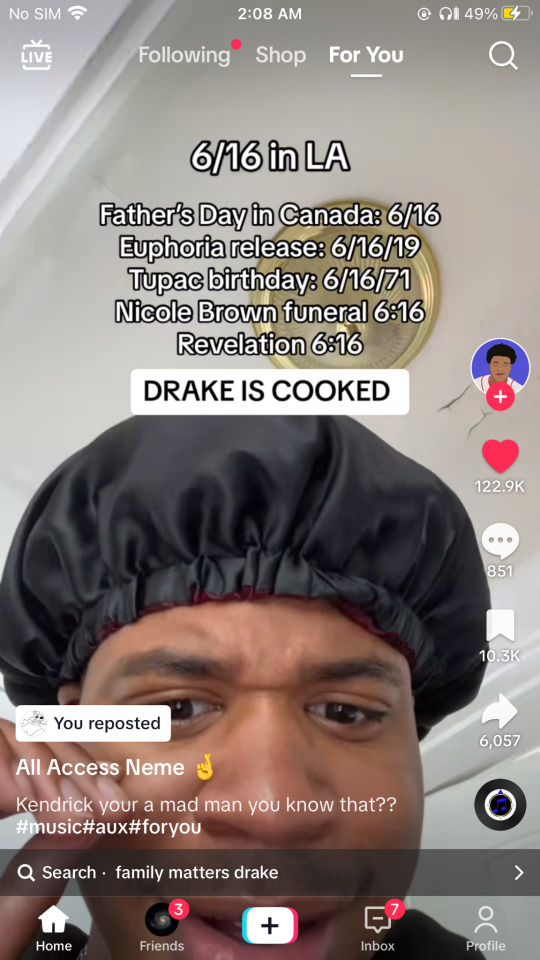
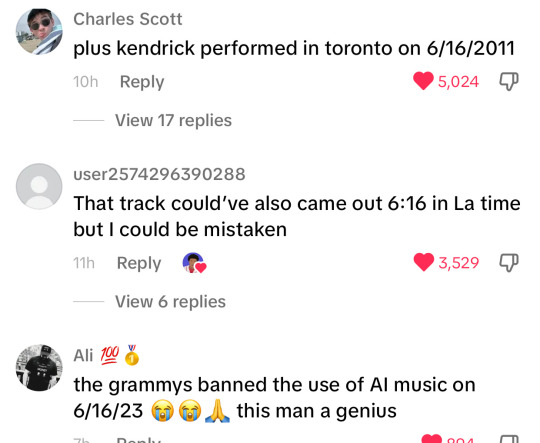
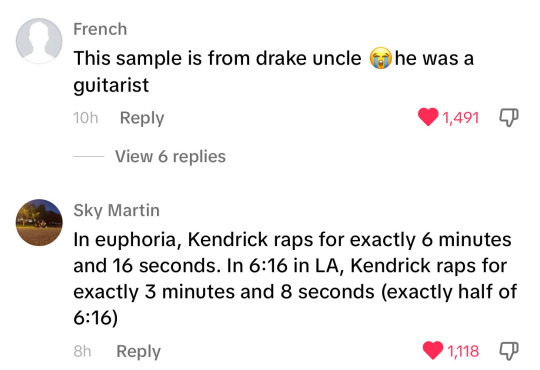
drake is fucking COOKED. kendrick won y’all idgaf
#kendrick is the greatest fucking rapper of this generation#his lyricism goes CRAZY#kendrick lamar#drake#champagne papi#j cole#future#metro boomin#kdot#reia rambles idk
2K notes
·
View notes
Text
it’s not that i have anything against hbomberguy but if u srsly need a white man to explain hip hop to u bc it’s the only way to keep u interested u actually suck
592 notes
·
View notes
Text
When J.Cole and Kendrick met up 🎙️🎙️
268 notes
·
View notes
Text
yeah just listened to not like us and at this rate kendrick's next track is just going to be a 30-second audio recording of him shooting drake directly in the head
#bee posts nonsense#or at least we can hope#i genuinely had to play it like three times in a row because i was too busy screaming to hear all the lyrics#get his ass!!!#kendrick lamar
275 notes
·
View notes
Text

318 notes
·
View notes
Text

#kendrick lamar#blxst#amanda reifer#die hard#mr. morale & the big steppers#kendrick lamar lyrics#songs#lyrics#quotes#music#handwriting
7 notes
·
View notes
Text
having been a taylor pop girlie all my life, this rap beef is making me understand that there's actually a lot of lyricism in rap that's not just tip-of-the-iceberg shit. i gotta admit, i listened to mr. morale and the big steppers after hearing not like us, and i shed more than a few tears.
so, this is me swallowing my pride and asking for rap record recommendations. please?
#absolutely LOVED the lyricism on meet the grahams#rap#kendrick lamar#drake#recommendations#mr morale and the big steppers#kendrick vs drake#kendrick diss#ngl i think i might just switch over to rap#if the writing is as good as kendricks???? damn i might just put up a poster
94 notes
·
View notes
Text
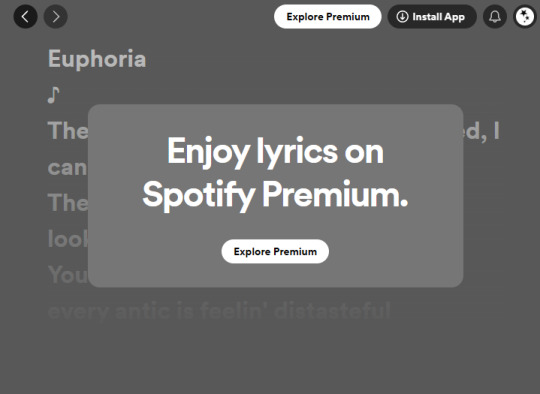
YOU'RE JOKING.
#inkyray#spotify lyrics#lyrics#spotify#im going to kms#and cry#kendrick lamar#kendrick diss#kdot#drake#matt sturniolo#sturniolo triplets#nick sturniolo#chris sturniolo#nicolas sturniolo#christopher owen sturniolo#christopher sturniolo#sturniolo#the sturniolos#the sturniolo triplets#matthew bernard sturniolo#matthew sturniolo
89 notes
·
View notes
Text
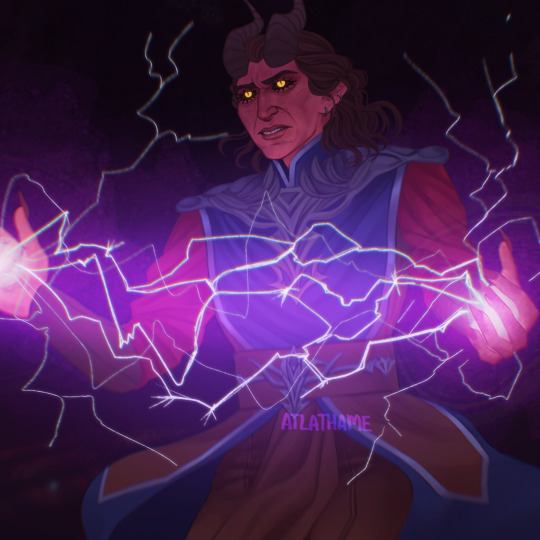
love's gonna get you killed / but pride's gonna be the death of you / and you and me
119 notes
·
View notes
Text
So now that I have an opportunity to scream about Kendrick Lamar’s Genius on Tumblr
Help yourself to this analytical essay I wrote in 2016 examining “To Pimp a Butterfly” and dissecting the stance that Kendrick is, by definition, a conscious rapper.
Shoutout to Drew Lindsay, the professor whose class I wrote this for. Also, please engage in lyrical analysis and music theory with me 🥺
Throughout his album To Pimp a Butterfly (TPaB), Kendrick Lamar is grappling with big issues of race and resentment. There are many layers to each song on the album and like any modern masterpiece, the true meaning lies below the surface and must be teased out. Many songs on TPaB come across as strictly fighting racism and helping along a powerful message in support of his roots. When digging deeper, we find that even the most overt black support anthems on the album have an argumentative element which questions Lamar’s roots and his thoughts on perceived racism. The conflict evident throughout the album is the incarnation of Kendrick’s personal struggle and reflects the conflict within the black community. TPaB’s message is not overtly positive or uplifting and is highly conflicted and therefore can not be classified as realist or conscious. At it’s core, To Pimp a Butterfly is not a conscious manifesto, telling the viewer exactly what to think, but a conversation about current racial issues that is not firmly positive or negative.
! “King Kunta” is the only track on the album that has a seemingly triumphant message all the way through; however this message takes on a sad note when put in the context of the rest of the album. When taken out of context, “King Kunta” comes across as a celebratory anthem, not only for Kendrick himself but for his homies and his people as well. The Lyrics, “Black man taking no losses” extends from his personal success to the triumph of a black art becoming the most popular music form in the mainstream. Even the title references the prolific slave “Kunta Kintae” who’s leg was
hacked for his “slights” against his white captors. Like a conscious track, it seems to have a clear surface meaning. However, as it happens over and over across the album, the traditional wholesome respectful themes of conscious rap are largely disregarded. The beat and production on this track are some of the most radio friendly and “trendy” on the album and the the first track to carry a piece of Kendrick’s Poem at the end. This seems to give “King Kunta” the high note before the gut punch of meaning. The message of “King Kunta” is predominantly “We made it guys,” but as the album progresses, we are made to beg the question “Made it where?”. As the next track on the record starts to deal with Kendrick’s old neighborhood and the clear negative points of contention start to reveal themselves, “King Kunta” becomes bleaker and more hollow in hindsight as the record progresses.
! “Institutionalized” compares Kendrick’s Compton neighborhood to a prison and starts to unpack conflicting feelings about the draw to his personal roots, and all the negatives that come with. As the preceding snippet of The Poem states “At fist you was conflicted,” it only makes sense that this theme rings throughout this song in many ways. There are many layers of conflict as well as many layers of persona in this track that should all be taken into account. Kendrick himself is “trapped in the ghetto” in more ways than one as he struggles to make a name for himself in the industry. Kendrick misses his home, but feels he can no longer relate to his old station after finding success; and yet he can never shake his ghetto roots and the baggage that comes with. There seem to be no positives left about Kendrick’s home and this displacement is furthered after he takes his homies to an award show and their first instinct is to steal from the celebrities around them. He so desperately wants to have a safe place in his
home when faced with the chaos and pressure of the music industry, but finds his home is now just as confining as the industry. As with most of the tracks on this record, Kendrick also acts as a surrogate for members of the black community to reflect common issues. The BET situation can easily be applied to any black kid who comes out of the ghetto and attempts to make something of themselves. The neighborhood and the attached stigmas follow any possible success and no matter how successful any one of these people gets, the inherent shame and conflict of their less successful or motivated peers and life station will always weigh on their minds. Throughout a predominantly conflicted and negative track, the chorus gives a single ray of hope through the mantra of “Shit don’t change unless you get up and wash your ass”.
! “Alright” uses a black stereotype to grapple with his personal struggle through life and compares it to the struggle of the black community as a whole. When we reach this track, the Poetic additions have reached “the evils of Lucy was all around me” and on the preceding track of “U” Kendrick and the album had hit their lowest point. As the track starts, a slew of new conflicts hits the table. Kendrick is facing his vices and the path he is headed down due to his fame and the influence of the music industry; comparing the game to “Lucy,” an incarnation of the devil in the form of a crafty woman. Again, he doubles as surrogate for the black community and the communal struggle, but fans out this connection to God. The “lawd lovin darkie” is a stereotype that Kendrick is playing on as a positive and embracing despite the pull against such topics in the mainstream rap industry. The voice of the track feels vastly positive; the bounce after the rock- bottom of “U”. However, “Alright” is nothing if not weighed down with struggle and sadness. The conflict of depression and hope clashes with every run of the chorus.
Lucy’s echo of Uncle Sam on “Wesley’s Theory” is a direct comparison of The Music Industry to Satan, a notion that Craig points out has been “a prominent, reoccurring theme [in music] for the past 30 years.”(Vigilant Citizen, 4). The bars have the same rhythm, but manage to hold their identity despite the change from 112 beats per minute(bpm) on “Wesley’s Theory” to the 56bpm of “Alright”. For a composition standpoint this is so impressive and Connor’s description of “...genius level record management in the tradition of Dr Dre”(Connor, 2) is not an exaggeration. The bpm change reflects Kendrick’s state in each song. “Wesley’s Theory” begins the album with a whirlwind ride to money and success with a fast beat and and a blasé attitude. By the echo, Kendrick has hit bottom and his life is crawling through the mud at a snails pace, prolonging his inner conflict and misery. “Alright” has the blurriest line between Kendrick as himself and Kendrick as the silhouette stand in for his people. Although the hook is positive and uplifting, the lyrics have weight and imply that Kendrick’s problems are also the problems of black individuals and the black community as a whole. The hook tells us that “We gon‘ be alright,” yet he describes his hope and his faith failing in times of deepest struggle, leaving the listener feeling (what a shock) conflicted.
! “The Blacker the Berry” is the summation of Kendrick’s struggle throughout the rest of the record; pitting racism against the existing problems perpetuated in the black community, resulting in an inconclusive conversation. This track is easily the most mind- bending and certainly the hard-hitting thesis of the record. Kendrick begins by claiming to be the “biggest hypocrite of 2015” in a mantra that gains weight as the song progresses. With the first verse confronting the white population and police brutality shattering the black community, the weight of the line “You made me a killer,” seems
obvious and, although striking, not extremely unique. As the track progresses, Kendrick accuses The Music Industry of making him a killer. Finally, Kendrick aims his accusations at his black brothers; gangbangers and thieves. If that wasn’t enough, the tracks introduction states “sometimes I get off watchin' you die in vain,” referring to his people. Although this could be the product of internalized racism, or Kendrick’s roots in the Blood/Crip war, nonetheless, it’s taking a stance that is not seen in conscious rap. Kendrick is facing that there is not one reason for violence or racism and therefore the problem can’t be fixed in any simple manner; certainly not one he holds the answer to. So who really made Kendrick a killer? Who made killers of any black man? As a representation, summation, and thesis of the rest of the album, Kendrick is having a conversation about where violence starts and presenting many possible options. They all repeat the same mantras, making them all equal and not singling any one out as more or less valid. In the end there is no clear resolution; just the statement of a problem and an intellectual presentation of thought. “The Blacker the Berry” states that many people and many groups are responsible for the perpetuation of racism, violence, and stereotypes, without attempting to “fix” the situation or even place blame as conscious rap is wont to do. When all of these things are called out, it is no longer about pointing a finger and starting a lynch mob. It becomes a critical reflection and the seed of a conversation. The running theme of the album persists as Kendrick becomes the echo of the black community and his inner conflicts become the conflicts within his community.
! As the album closes, Kendrick’s personal struggle is completely conveyed in a masterful comparison of himself to Tupac Shakur. His journey is not tied up in a neat
bow and the entirety of the album is left open-ended. We are not told explicitly “Kendrick will/will not meet the same end as Tupac,” but left to ponder and discuss. In the same way, we follow Kendrick’s reflection of the black community to its close without resolution. Many believe that “Underneath the tragedy and adversity, To Pimp a Butterfly is a celebration of the audacity to wake up each morning to try to be better, knowing it could all end in a second, for no reason at all,”(Jenkins, 3) and although that is a fair assessment of the album; trying to wrap up a record as complex and nuanced as To Pimp a Butterfly in a neat bow of optimism like that doesn’t do it any justice. TPaB would be nothing without its unending conflict and roller coaster of ups and downs. This blend of conflict and pain is our heart line direct to Kendrick’s soul as his confessional develops and our uniting point as a community under the problems he presents. As The World’s Busiest Music Nerd stated, “[Kendrick’s] not telling us what to think... [he’s] contradicting himself”(Fantano, 11:08). This inability to take a stand (among other explicit sexual and violent gangster themes) is ultimately what disqualifies To Pimp a Butterfly from the conscious spectrum. If the album was anything but what it is, we as the listener would not be able to discuss how we address the problems presented. The album would lose all intrigue and conversation if we were left with a solid resolution. To Pimp a Butterfly is a 78 minute conversation, to create a century’s conversation.
Sources Sited
Theneedledrop, and Anthony Fantano. "Kendrick Lamar - To Pimp A Butterfly ALBUM REVIEW." YouTube. YouTube, 18 Mar. 2015. Web. 14 Apr. 2016.
An in-depth analysis of the formal elements of “To Pimp a Butterfly”. A moment I found really compelling was just around 11:18 when Fantano talks about the conflicted nature of the album. Alludes to Kendrick making a conscious album, but pays very close attention to the music beneath the flows and how it compels the message. The rare 10/10.
Connor, Martin. "Kendrick Lamar: Rap Music Analysis." The Composer's Corner. Blogspot, 24 July 2015. Web. 14 Apr. 2016.
Connor analyzes Lamar’s production unity despite multiple producers. He hails this foresight into record management as genius level: on par with Dr Dre’s production insight and Jay-Z’s ear for album unity. Connor goes on to compare the seeding of musical ideas across tracks to classical compositions. He uses the example of an echoing verse with identical musical rhythms; despite the bpm change across tracks (56bpm on “Alright” and 112bpm on “Wesley’s Theory”
Jenkins, Craig. "To Pimp a Butterfly." Kendrick Lamar: Album Review. Pitchfork Publications, 19 Mar. 2015. Web. 21 Apr. 2016.
“Underneath the tragedy and adversity, To Pimp a Butterfly is a celebration of the audacity to wake up each morning to try to be better, knowing it could all end in a second, for no reason at all.”
Business, Music. "Kendrick's Deeper Story." Vigilant Citizen. The Vigilant Citizen, 27 Nov. 2015. Web
#kendrick lamar#k dot#to pimp a butterfly#tpab#tupac shakur#rap#musical analysis#conscious rap#gangsta rap#lyrical analysis#academic writing#long post#*shoves my hyperfixation down your throat*
71 notes
·
View notes
